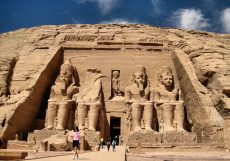
Between 1868 and 1902 there were many reasons why Britain wanted to obtain influence in Africa. Some wanted influence in Africa as a line of defence like Gladstone, Cecil Rhodes wanted to civilise Africa with his ideology of ‘New Imperialism’ and many businessmen set up trading companies in Africa to gain access to raw materials. However I believe that economic motives were to a large extent the driving force to why Britain wanted to achieve these goals.
From 1860 Britain always had an interest in Egypt. This was due to what Palmerstone said: ‘We wish to trade with Egypt.’ This remark hinted at its economic potential for Britain. This attitude was shown when the French built the Suez Canal in 1869 and this attracted considerable British investment in Egypt and the canal itself. However the French were also interested in Egypt’s potential wealth.
In 1882 the British invaded Egypt and succeeded in obliterating the nationalist uprising led by Colonel Arabi. Although some may argue that crushing the rebellion was the main reason for the invasion the roots to why they wanted to stop the uprising in the first place was mainly economic. Egyptian nationalism could have freed Egypt from the rule of Turkey meaning that it could also have made alliances with European countries such as France. Although this sounds like a strategic motive, the reason why they didn’t want France to have influence was because it threatened Britain’s economic investments. Another reason was that many textile manufacturers new that Egypt’s agricultural land produced high quality cotton and wished to exploit this opportunity. It also threatened the trade route to India which was another economic interest because it was the shortest trade route to India. And the shorter the route the more goods could be transported between Britain and India in a shorter time span. For British business this meant faster trade, better profits and more raw materials to fuel the industrial revolution. Therefore what Britain was doing was strategic. However the motives behind the strategy were to a large extent economic.
Britain wanted to make sure that they stopped other European powers like France, Belgium and Germany from having colonial control in West Africa. From the early 1880s British merchants were worried that Britain’s policy of informal empire and free trade in the region may have its benefits lost because of the growing interest of French and German trading rivals. British merchants were led to demand government intervention. This dilemma was a motive for Britain and it may seem like the motive was purely to win a power struggle against Britain’s competitors. However the reason for the power struggle was economic as shown by the way the British government dealt with the situation. They established the Oil Rivers protectorate in 1884 and the chartering of the Royal Niger Company two years later. Both these responses were used to aid merchants in the intense economic conflicts because the protectorate was used to consolidate Britain’s control over the delta of the river Niger, a main market for trade. The Royal Niger Company was used to strengthen its monopoly of trade in the area and because of its size it made competition from France and Africa very difficult. This meant that Britain now had a stable flow of money coming from West Africa.
Image: By Francisco Anzola (Abu Simbel Main Temple) [CC BY 2.0 (http://creativecommons.org/licenses/by/2.0)], via Wikimedia Commons

0 Comment:
Be the first one to comment on this article.